- Home
- Joan Lowery Nixon
A Dangerous Promise Page 3
A Dangerous Promise Read online
Page 3
"How old are you?"
Mike could hear Todd gulp before he answered, "Sixteen, sir."
The sergeant raised one eyebrow, but began at once to rummage through his papers. He pulled out a form, which he handed to Todd. "Colonel Mitchell's got a standing request for musicians. Pay's twelve dollars a month when
we've got it. Right now we haven't got it. Sign here for a ninety-day stint, write 'musician' after your name, and report quick as you can to Sergeant Porter to pick up your uniform and supplies. You'll find him at the end of this row of tents."
"Yes, sir!" Todd exclaimed. He scribbled his name before glancing back at Mike. "I'll see you later," he called, then hurried off to find the supply sergeant.
Grinning, the sergeant who had signed up Todd bent down face-to-face with Mike and said, "Sonny boy, you've got to know you're way too young to join the army."
Mike tried to stand as tall as he could and blustered, "I look young for my age, but I'm sixteen."
The sergeant guffawed, as did some of the men standing nearby. "Sixteen, is it? I'm telling you, you're not a day over thirteen."
"I heard you're short of musicians," Mike said. "What does it matter how old I am if I'm needed?"
"What matters is there are rules we gotta go by. Now, run along home, sonny. Your mama is going to be worried about you."
With that, the sergeant turned away from Mike, busying himself with a group of men who had approached his table. Mike didn't budge. / can't go back, he told himself in desperation. The army has to take me. It has to! He slipped his drumsticks from his pack, straightened his back, and began to beat out the drill calls for advance and retreat.
"Hey, now! What's this?" the sergeant yelled at him, but the flap on a nearby tent opened and a Union officer stepped out. He watched Mike for a minute, then strode to stand next to the sergeant. He held up a hand for silence, and Mike obeyed instantly.
"Captain Dawes, sir," the sergeant said. "I'll send this young rapscallion packing."
"Not so fast," the captain said. He studied Mike. "What's your name, son?"
"Michael Kelly, sir. Everybody calls me Mike."
"Where do you come from, Mr. Kelly?"
Mike's thoughts lurched from the captain and Mrs. Taylor and their home at Fort Leavenworth, to his ma living in St. Joseph, to his first home with Ma and Da and five brothers and sisters in New York. Captain Dawes was waiting for an answer. Mike took a deep breath and said, "I came west out of New York City on one of the orphan trains, sir."
"I've heard of the orphan trains," the captain answered. He studied Mike. "So you're an orphan with no family."
No! Mike hadn't meant to deny his family. While he fumbled for the right words, the captain asked, "How old are you?"
"I—I'm not exactly s-sixteen, Captain Dawes," Mike stuttered.
At this the captain smiled. "Nor even fourteen," he said. "Do you know all the caUs?"
"Yes, sir."
"Is that your own drum?"
Mike held it up proudly. "It was given me by a soldier who brought it through the Indian wars."
"Sir, the age rule—" the sergeant began.
But Captain Dawes interrupted. "The age rule applies to regular soldiers. Sergeant Gridley. A musician isn't a regular soldier and doesn't carry a gun. My unit is in sore need of a musician, so sign Mr. Kelly up. Have him report to me in uniform on the parade ground in half an hour."
Mike could hardly keep from jumping and shouting with joy. "Thank you. Captain Dawes!" he managed to stammer.
As he bent to sign the paper that Sergeant Gridley shoved under his nose, he felt a great goodwill toward everyone—even Sergeant Gridley. But before Mike could open his mouth to say so, Gridley barked, "You can inquire as to what the supply sergeant might have for you, Mikey boy. I'm afraid it won't be much. Far as I know, he didn't order any uniforms in children's sizes."
"From what you're wearing, Fd guess he has a good stock of wide-bottomed pants," Mike shot back.
As some of the soldiers in earshot guffawed, Mike hurried away, following the route Todd had taken. He'd come to fight Rebs, not loudmouthed sergeants, he reminded himself, and it certainly didn't make much sense to take on a man three times his size.
Within a few minutes he found the supply sergeant, who groaned when he saw the size of the newly appointed musician.
"You'll need your sturdy belt to hold up the smallest size pants we've got," he said, "and I can't do much about a jacket without rolling up the sleeves."
"I'm growing fast," Mike said.
"It's not fast enough," the supply sergeant said. He went through his stock, finally coming up with oversize drawers and socks, a jacket and pants, a forage cap with a musician's brass bugle on the front, a canteen, a woolen blanket, and a rubber blanket. "I can't help you with boots," he told Mike. "We didn't get any boots, and how some of these men are going to march for miles in shoes that are falling apart . . . well, never mind. Report back to Sergeant Gridley for your assignment. Although he hasn't got enough tents. You'll find yourself sharing one with at least three other men, maybe four. When one man rolls over, everyone rolls over."
Mike laughed, but the supply sergeant shook his head sadly.
What does it matter? Mike thought. The weather's warm. I can make my bed outside, under the stars. Slapping his cap on his head, making sure the brim dipped over his forehead at a jaunty angle, Mike carried his supplies back to Sergeant Gridley, who grinned as he gave Mike his tent assignment. Thankful that the sergeant was a man who could take a joke, Mike easily found the tent and changed into his uniform.
Just as the supply sergeant had warned, Mike had to roll
up the sleeves and pants legs. He felt as if he were dressed in Captain Taylor's clothes. / may not fill your shoes yet, but someday I'll make you proud of me, he thought, smiling to himself.
Out on the parade ground Captain Dawes took one look at Mike and said, "Can you use a needle and thread?"
"No, sir," Mike said. He tried to ignore the grins and joking comments of the men assembled for drill, but his face burned with embarrassment.
"Then we'll find someone who can," Dawes told him. "We'll do our best to outfit you the way a soldier should be outfitted. Now, let's get these men in shape. Sound the call to drill, Mr. Kelly."
"Yes, sir," Mike said, grateful to this fine man. He was determined to do Captain Dawes's bidding forever. He'd stand by his side, drumming the calls in the thick of battle. Mike fiourished his drumsticks and beat out the sharp roll that signaled the men to fall into line and stand at attention.
For half an hour they worked until the men learned to interpret the drumbeats that carried their officer's instructions from advance to retreat. "That was good work, Mr. Kelly," the captain said at the end of the drill, loudly enough for his troop to hear.
"Thank you, sir," Mike answered. He reddened again, but this time with pleasure.
Then Captain Dawes announced, "Tonight will be a good time to write letters to those you've left at home. Tomorrow, under Major Sturgis's command of the Fourth Battalion, our Second Kansas Infantry will begin a trek into southern Missouri to join forces with General Lyon's brigade."
Mike vaguely heard Captain Dawes say that the march would involve more than two thousand men just in the Fourth Brigade alone, but Mike's mind was on the letters he needed to write. He'd left one for Louisa, but by all rights he needed to tell Ma what he'd done, and he couldn't leave out Frances and Petey, Megan, Peg, and Danny. He needed to
know they'd be thinking of him and praying for him. Good thinking to have tucked writing supplies into his pack! No matter what, Mike promised himself, he would write those letters before lights out.
But soon Mike saw that finding time to write letters would be more difficult than he imagined. Nor did he have time to search for Todd and share his great news that he was now a member of the Union Army, too. hnmediately after supper. Sergeant Gridley cornered him.
"You don't think your work is over, do
you, boy? Any soldier bold enough to talk back to his superior certainly must have energy to carry water for the horses and firewood for the cook. And when you're done with that, there's more to do." So the sergeant wasn't open to a bit of fun, Mike thought. He'd have to be more careful to keep his mouth shut about wide-bottomed pants and such in the future.
Not until after drumming tattoo, the evening roll call designed to discourage deserters, could Mike escape his chores for the night and head for his tent. To his surprise and delight, Todd was there, spreading his rubber blanket on the ground.
A burly corporal with a dark beard as thick as a bush laughed and said to Mike, "Sergeant Gridley thought you boys would like to be together." He held out a hand as big as a beefsteak first to Mike, then to Todd. "The name is Harley Botts."
Two other men squeezed into the tent, and Corporal Botts introduced the other tent mates: a lanky, straw-haired eighteen-year-old named Ben Doland, and a shorter, plump, balding man named Billy Whitley.
Then, to Mike's surprise, Harley pulled a needle, thread, and scissors out of his jacket pocket. "I volunteered to do something to make that uniform fit you a mite better, Mike. Take off the jacket, and I'll see what I can do."
"You can sew?" Mike asked. He had seen women taking dainty stitches as they darned and mended, but the idea of this huge man doing the same was astounding.
"It's a skill that's come in handy more often than not," Harley said, and he proceeded to fold, bend, and cut, then stitch with a needle that almost disappeared between his large thumb and finger. Mike watched, fascinated.
By the time Mike's pants were taken in at the waist and shortened at the legs, Todd had filled him in on what he'd done during the day.
"Not half a sight as much as I had to do," Mike grumbled, and explained his run-in with Sergeant Gridley.
Todd whooped with laughter, but Harley reminded the boys that a well-run army called for firm military order among the troops. "Sergeant Will Gridley's a fair man," Harley said, a twinkle in his eyes softening the seriousness of his words, "but it's best that you keep a civil tongue in your head, Michael."
"I will," he assured Harley. But Mike's repentance was short-lived as Ben and Billy joined in the conversation about what life in the army was like for volunteers.
"There'll be bugs in the bedding, and how they bite!"
"Don't be expecting home cooking. You could just as easy chew through a harness as through some of the meat we get."
They added a bit of good-natured gossip about one officer or another, and even Harley couldn't help but smile. The companionship made Mike feel a real part of the Union Army, bedbugs and all. Hearing Todd chuckle, Mike was sure that Todd felt the same way.
Harley informed the boys that Todd would be directly under Colonel Mitchell's command, and Mike under the same command but with Captain Dawes's troop. Together, as part of the Second Kansas Infantry, they'd leave in the morning in a march to fight the Rebs.
"Tomorrow," Todd said.
"Tomorrow," Mike echoed, his heartbeat quickening. He reached into his pack for his writing supplies. With a war to be won, who knew when next he'd find time to write?
No ONE NEEDED to wake Mike the next morning. He was up, dressed, and in position before the duty officer arrived. Along with the other drummers throughout the camp, he beat out the rrrrat-a-tat of reveille to call the sleeping men to assembly.
The soldiers ate breakfast quickly, dismantled the tents, and stored them in the long train of wagons, which also carried ammimition, field equipment, and other supplies.
The air crackled with excitement, and Mike's breathing quickened as uniformed men, full packs on their backs, assembled at the sound of the drum roll.
Dragoons, resplendent in their colorful uniforms, and blue-uniformed riders in Company One of the Second Kansas Mounted formed their units on the road, eager for orders to begin the march. Even the horses caught the excitement, snorting and tossing their heads as artillery was wheeled into place. Over the creak of wagon wheels, the shouted conmands, and the overall noisy bustle, five com-
parties of cavalry, six companies of regular infantry and dragoons, and ten companies of Kansas volunteers received their orders and fell into line to begin the trek toward Grand River in southwestern Missouri.
Dust from the horses and wagons rose like a cloud. Soon a fine gray powder covered the eyebrows and beards of Mike's fellow marchers. The drums set the pace for the first few minutes, after which the men fell into a slower, less measured walk. Some of the soldiers were fit and walked vidthout complaint, but a few stragglers groaned and lagged behind.
"Was there ever heat like this?" Billy complained. He pulled off his forage cap to wipe his bald head with a muddy cotton handkerchief. Rivulets of sweat mixed with the dust on his face and trickled down in dirty streams.
Harley Botts spoke up. "Better get used to it. You've got a long walk ahead of you."
"I was countin' on fightin' the enemy, not doin' all this walkin'," Billy grumbled.
"All well and good," Harley countered, "but you've got to get to the Rebs first, and the only way to do that is to put one foot ahead of the other and keep goin'."
A messenger on horseback raced past, kicking up new clouds of dust that made Mike cough and rub his eyes. His stomach growled loudly, and he realized how hungry he was.
Harley turned to Mike. "They should have plenty of provisions for our noon meal, but when supplies run low they'll set us to foragin'."
"Foraging? What does that mean?" Mike asked.
"It means stoppin' at farmhouses and requisitioning whatever foodstuffs they've put by, whether it's com from their fields, potatoes in their cellars, or hens from their barnyards."
"Do we buy them?" Mike thought of the pitifully small amount of money he carried with him.
Harley grinned. "No. We help ourselves. The citizens should be glad enough to aid the soldiers who're goin' off to battle to protect them."
"But to take a farmer's chickens is stealing," Mike protested. The memory of his copper theft in New York City and all the trouble it had caused filled him with pain.
"Which is easier—to give a few chickens, or to give a son to battle?" Harley asked.
Mike thought about his Kansas bunkmates who had left their farms and volunteered to fight. "Some families give both."
"All the more reason, then, to feed Union soldiers."
"I guess so," Mike answered, but he was glad for a loud interruption to this conversation.
"Halt!" a sergeant called. Stomachs growling, the men lined up for their rations of dried beef and hardtack.
Hearing the lapping of a small creek, Mike ran to it as soon as he had eaten. He let the bubbling water run over his hands as he refilled his water bottle. Then he pulled off his cap and splashed the cool water over his sweaty face and neck until they were clean. His pack and drum seemed to have gotten ten times heavier over the course of the march. He would have given anything for a chance to crawl into a spot of shade under the bank along the creek bed for a long, deep sleep, but he barely had time to imagine such relief when he heard the sharp call, "Formation!" and the march began again.
Mike trudged along, hour after hour, stopping only to wait as messengers on horseback raced at breakneck speed from the front of the line to the back and then to the front again. Conversations among those around him began to lag. Nothing seemed important enough or interesting enough to talk about, especially through that constant, powdery, choking dust.
Finally, to Mike's great relief, the long straggling line of marchers was instructed to make camp for the night.
Mike still had to drum the calls to supper, then tattoo and taps. As soon as Mike had finished, Todd joined him, and the two of them found a patch of relatively smooth ground where they could spread out their rubber blankets. They beat the dust from their clothes, took off their shoes, and stretched out, rolling their woolen blankets up and over them.
Todd yawned noisily and squirmed on his mat. "I'l
l tell you this much," he said. "This is nothing like the feather mattress on my bed at home."
"Home ..." Mike repeated. But before he could finish the thought, he fell into a sound sleep.
He awoke early in the morning, as light first streaked the sky. He scrambled to get dressed and took his place with his drum. The moment he heard the command, Mike woke the sleeping men in his company with the sharp beat of his drum.
The march, with so many men and so much equipment to move, proceeded slowly. Mike could only guess at the reasons for the countless stops.
The heat became almost unbearable, but even an occasional rain shower, welcome as it was, was a mixed blessing. Musty wet woolen clothing, steaming dry in the sunlight, only worsened the stench of men who couldn't remember when they'd last laid eyes on a bathtub. Mike crinkled his nose, eager for this exhausting, boring march to be over and the battle to begin.
During the rest periods, the soldiers spoke of their loved ones, and some mournfully sang songs that reminded them of home. Mike, too, had pangs of longing for his family, but he worried most about Todd, who wore an expression of unrelieved sadness. As Billy reminisced about his wife and two small boys, a strangled sound, suspiciously like a sob, escaped from Todd.
"I've got five sisters," Todd mumbled. "They're sweet
little girls, all of them depending on me for protection ever since our father's company was sent off to Virginia."
Harley was blunt. "Then why didn't you stay home with them? Why'd you sign up?"
As Todd hesitated, Mike quickly spoke. "It won't do his sisters any good if those Confederate Rebels win the war. What might happen to our country then?" He clapped a firm hand on Todd's shoulder.
Todd lifted his chin. "That's right," he said. "Mike and me —we heard the Federals were short of musicians. We knew the calls, so we were bound to serve."
"It would be nothing short of pure selfishness to hide our talents," Mike added.

 The Internet Escapade
The Internet Escapade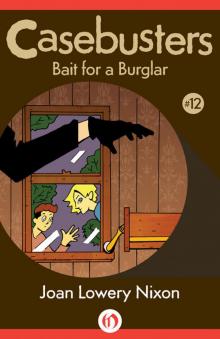 Bait for a Burglar
Bait for a Burglar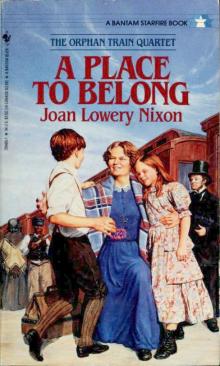 A Place to Belong
A Place to Belong Nightmare
Nightmare Sabotage on the Set
Sabotage on the Set The Other Side of Dark
The Other Side of Dark Whispers from the Dead
Whispers from the Dead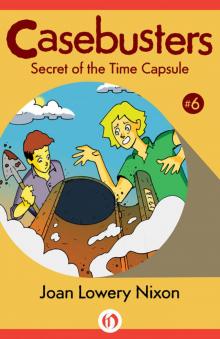 Secret of the Time Capsule
Secret of the Time Capsule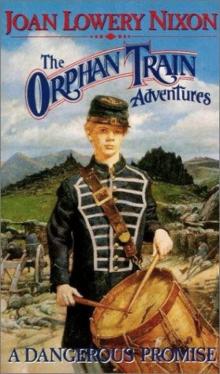 A Dangerous Promise
A Dangerous Promise Laugh Till You Cry
Laugh Till You Cry Spirit Seeker
Spirit Seeker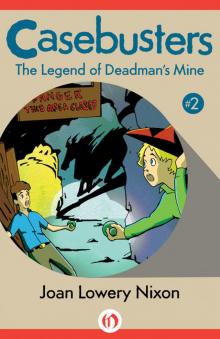 The Legend of Deadman's Mine
The Legend of Deadman's Mine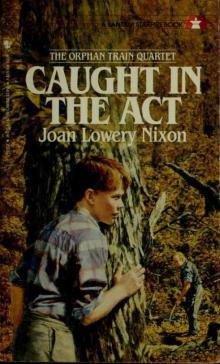 Caught in the Act
Caught in the Act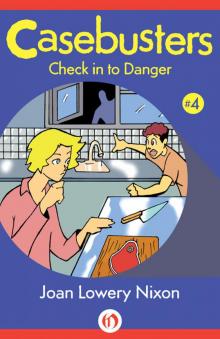 Check in to Danger
Check in to Danger Ellis Island: Three Novels
Ellis Island: Three Novels The Name of the Game Was Murder
The Name of the Game Was Murder The Haunting
The Haunting Lucy’s Wish
Lucy’s Wish Playing for Keeps
Playing for Keeps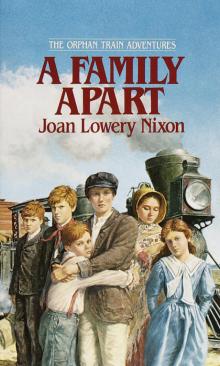 A Family Apart
A Family Apart Nobody's There
Nobody's There Shadowmaker
Shadowmaker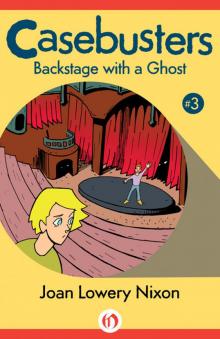 Backstage with a Ghost
Backstage with a Ghost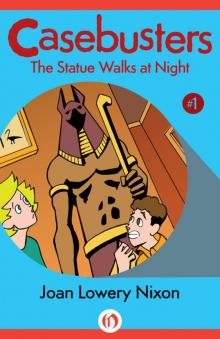 The Statue Walks at Night
The Statue Walks at Night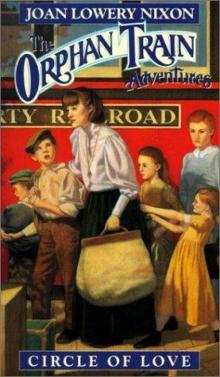 Circle of Love
Circle of Love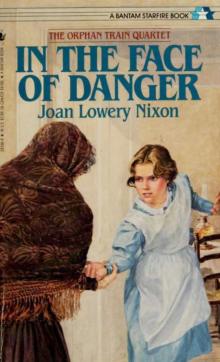 In the Face of Danger
In the Face of Danger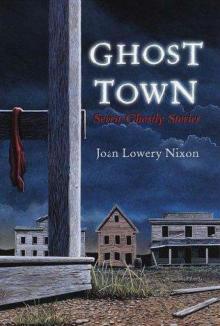 Ghost Town
Ghost Town A Candidate for Murder
A Candidate for Murder The Weekend Was Murder
The Weekend Was Murder The Island of Dangerous Dreams
The Island of Dangerous Dreams The Ghosts of Now
The Ghosts of Now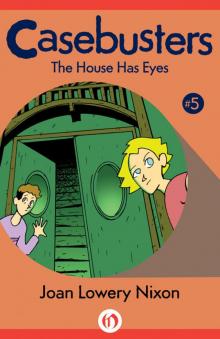 The House Has Eyes
The House Has Eyes The Dark and Deadly Pool
The Dark and Deadly Pool Keeping Secrets
Keeping Secrets Secret, Silent Screams
Secret, Silent Screams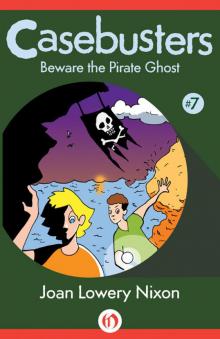 Beware the Pirate Ghost
Beware the Pirate Ghost Search for the Shadowman
Search for the Shadowman Haunted Island
Haunted Island